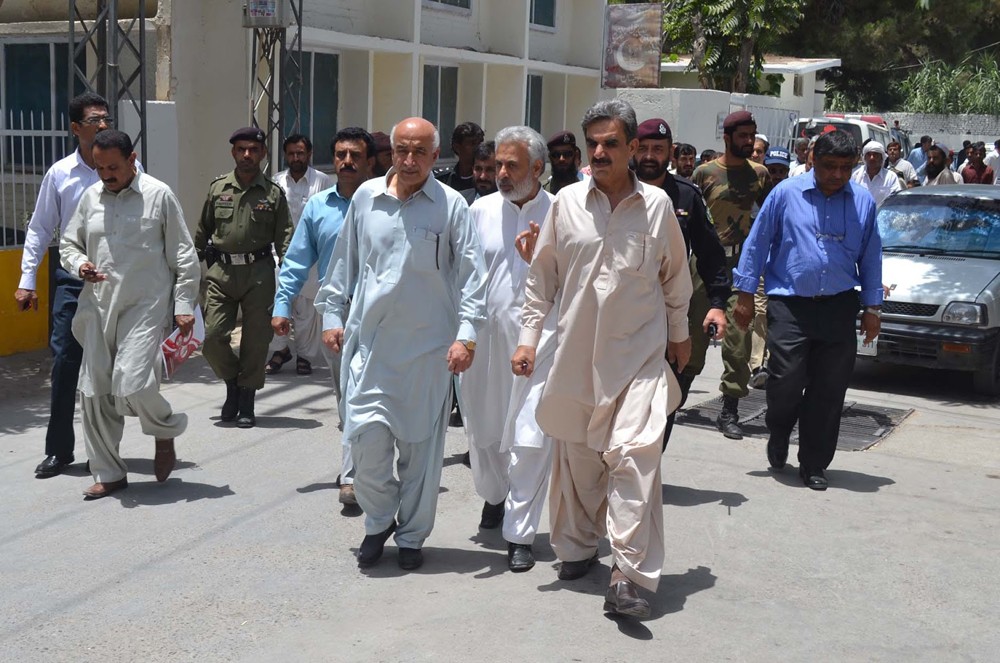
Will the PML-N bring in a new chief minister replacing Dr Abdul Malik under the Murree Agreement?

Two types of speculations regarding the change of the Balochistan chief minister are doing the rounds in Quetta. Rooting their argument in the Murree Agreement of 2013, some believe that Balochistan will have a new chief minister, this time from the PML-N for the remaining tenure of government.
From this perspective, odds are that Sardar Sanaullah Zehri will be the new chief minister. The second opinion is that Dr Abdul Malik shall continue to be the chief minister even for the second half of the tenure no matter what the Murree Agreement says.
Although internal factors in Balochistan militate against any change in the office of chief minister, the decision rests with the prime minister, whether to change the chief minister or not.
Capitalising upon strides made under last year’s National Action Plan, the National Party and the PkMAP -- the two more compatible coalition partners than their PML-N counterpart in the province -- cashed in on improved security situation in Balochistan in general and Quetta in particular. The duo also turned to their advantage the partial success made on the front of Baloch reconciliation and peace talks with Baloch separatists aimed at bringing them back to state fold. "Any reshuffling in the provincial government will reverse our hard-won battle on the law and order front in the province," alarmed a well-placed source in the Balochistan coalition government.
Abdul Raheem Ziaratwal, minister from PkMAP in Balochistan Assembly, believed that the "tripartite coalition government has been performing better than the previous government. Before us, the government buildings could not hoist national flag even in Quetta city. We have increased education and health budget. We have established universities in Turbat, Loralai and Sui each and upgraded the status of Agriculture College, Bolan Medical College and Khuzdar Engineering College to universities."
Moreover, the coalition partners are more convenient with the incumbent "middle class" chief minister who behaves like one of them rather than a tribal sardar with whom they are not comfortable. "Dr Sahib is at our disposal," stated a PkMAP’s member of the provincial assembly. "He is accessible and does not mind even when we intrude while he is in a meeting."
A PkMAP’s heavyweight, who wished not to be named, said, "We have some grievances against Dr Sahib, but we are satisfied the way he deals with us. As per the Murree Agreement, we are obliged to accept anyone as chief minister who is appointed by the PML-N though we would like Dr Malik to continue."
The appointment of Sardar Sanaullah Zehri, the most likely candidate as the chief minister, is likely to complicate Nawaz Sharif’s friendly relations with Sardar Akhtar Mengal, the chief of Balochistan National Party (Mengal). True to Pakistan’s political traditions, political power translates into settling scores with opponents. The Zehri-Mengal tribal feud is likely to fester if Zehri replaces the sitting chief minister. The prime minister knows that he can ill-afford to alienate Mengal, an influential and well-respected Baloch sardar, at a time when the provincial government is in the midst of reaching out to the Baloch separatists.
With a thorough gentleman image among the common public, Dr Malik is recognised as a placid chief minister in the wider audience. His continuity in the CM office will be a popular decision. Moreover, there is no serious charge against the current chief minister. A senior government officer who served in Quetta for a couple of years maintained, "Although there are administrative deficiencies, the chief minister is not financially corrupt." Whether chief ministership will change hands in Balochistan or not, the answer does not lie in Quetta but Islamabad.
A well-placed source in the coalition government opines, "If there is no willingness from the prime minister side, the in-office chief minister will stay in power." For a number of reasons, the prime minister may not opt to change the chief minister as required under the Murree Agreement.
First, he wants neither himself nor his party to be held accountable for the Baloch woes, such as missing persons and the dead bodies unaccounted for. Second, the PML-N centre in Lahore would never like to be seen responsible for the lack of development in Balochistan at the end of 30-month short stint in a coalition set-up where the party will have little, if any, leverage to initiate development. Third, a PML-N chief minister in Balochistan is likely to leave the central leadership in an awkward position. The central leadership will be least tempted to get tagged as an ‘imperial Punjab ruling Balochistan as its colony’. The same charge could not be levelled against the preceding PPP led coalition government because the PPP, unlike the PML-N, shared a common victim narrative with Baloch and Pashtun nationalists.
In all likelihood, Dr Malik Baloch may continue as the chief minister of Balochistan and complete the five-year tenure.